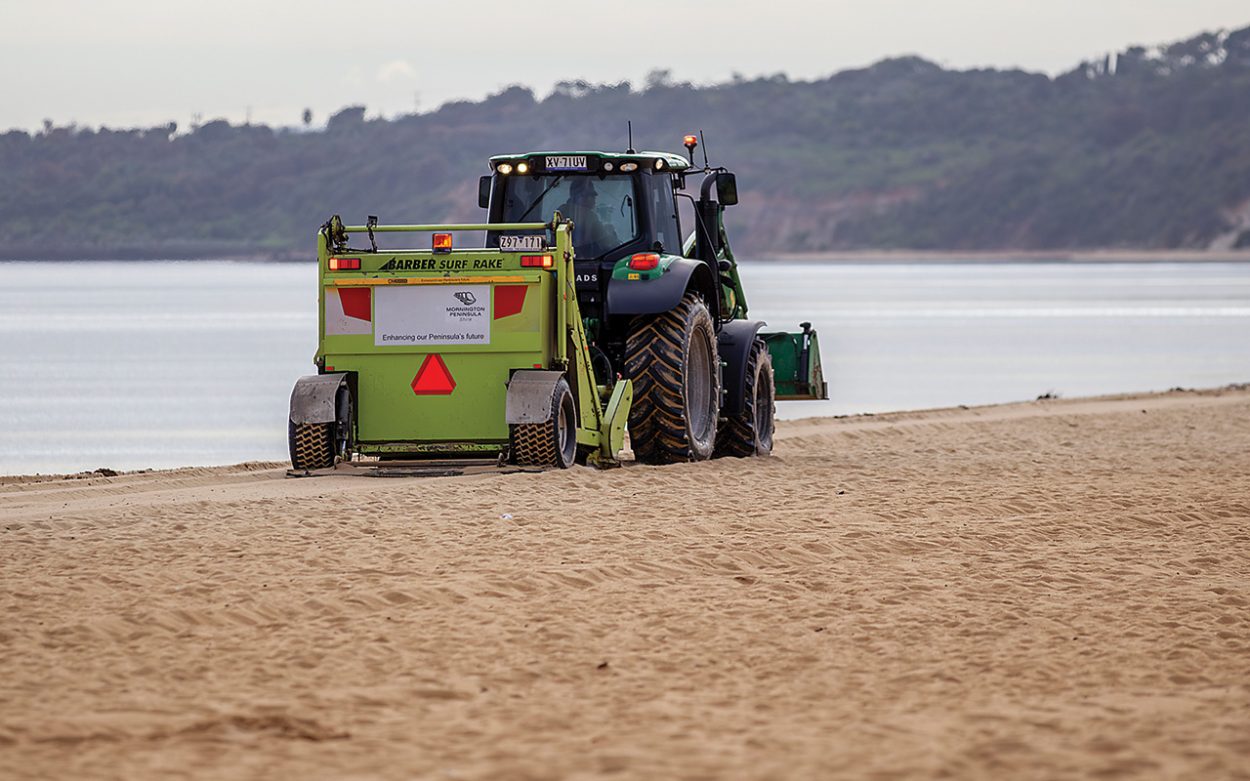MORNINGTON Peninsula Shire councillors have officially abandoned hand cleaning along its Port Phillip beaches with mechanical raking to be reinstated, ending months of indecision and community backlash.
The council has been trialling hand cleaning all bay beaches since last July after concerns were raised that mechanical raking was leaving behind litter, with plastic items also being broken down into smaller pieces and buried in the sand. But proponents of the rake say it’s more efficient, while ensuring smooth, well-groomed beaches.
According to a council audit, 85 per cent of material collected by the rake was organic material including seaweed, which was taken to landfill where it produces emissions. In January alone, just over half a tonne of waste was taken to landfill. The council has estimated that disposal costs would be under $150,000 per year when beaches are not impacted by significant storms.
Volunteers, who have dedicated their time to working with a team of shire contractors in manually collecting debris from about 32.5km of coastline, saying raking would again pose risks to beach ecosystems and its natural beauty. But councillors, in a 6-4 vote, decided to reinstate mechanical raking which would cover about 80 per cent of the beaches, while hand-cleaning would continue at beaches unreachable by machine.
With the issue being contentious, a tense meeting saw interjections by the public gallery, prompting the mayor Cr Anthony Marsh, to pause debate intermittently. A shire report had recommended the council reintroduce raking on just 30 per cent of beaches, but Cr Bruce Ranken led an alternative motion that machine raking be brought back. “I think we all agree this has been a very long, drawn out and very complex item we inherited from the previous term,” he said, in which he acknowledged the “community for their passion around this complex issue”.
Ranken said some of the benefits of machine cleaning was that it covered large areas quickly, reduced labour costs, and helped remove debris and pollutants, while “contributing to a cleaner and healthier beach and marine environment”. But Cr David Gill, a strong advocate for hand cleaning, argued “you’re going to wreck our beaches by combing them, removing the natural environment”. “The scientific evidence says the beach raking is not effective. It leaves things in the sand that you can’t find. “The beaches are coming back to their natural state and now we’re going to go backwards again.”
Council officers had advised hand cleaning of at least 70 per cent be applied to its beaches. The council report noted that “allowing organic material to break down via natural processes on the coast can reduce carbon emissions, provide habitat and food for animals, provide nutrients to support plant growth, deposit seeds promoting natural regeneration and attenuate wave energy”. “These outcomes contribute towards a healthier coastal ecosystem and increase erosion resilience of our beaches.”
But it noted a “clear sentiment within public survey responses that members of multiple coastal clubs prefer mechanical raking for the aesthetic and grooming effect it provides which supports their recreational use”.
Cr Patrick Binyon also did not support the motion, saying “at the heart of this discussion is probably the need to strike a balance between ecological sensitivity and the public’s perception of what a clean beach is”. “Hand cleaning is far gentler on coastal vegetation, including the endangered Coast Saltwort and encourages the spread of native plants that help to root, stabilize sand, and build gentle dunes,” he said.
A 522-response survey found since the trial began, 57 per cent of respondents said visiting the beach had become less enjoyable since raking ended, with 55 per cent saying they did not support continuing with hand-cleaning.
Award winning beach cleaning campaigner Josie Jones OAM said returning to a mechanical rake would undermine months of community-led environmental efforts. “Beach Patrol’s data shows a significant reduction in litter volumes. What we should see instead is increased cleansing efforts — not raking,” she said. “Continuing to fund mechanical raking is not only ineffective, it also traps our volunteers in a cycle of cleaning up after a flawed system, rather than addressing the root causes and investing in long-term behavioural change.”
Mornington Peninsula Beach Box Owners president Peter Clarke said he supported the council’s decision, citing safety as a concern. “The overwhelming views from beach box owners were really about the safety issues … the hand cleaning system wasn’t doing the job and was leaving a lot of dangerous objects either under seaweed or in seaweed,” he said.
“The most notable ones were particularly kids getting fishing hooks stuck in their feet, and there’s a couple of fairly bad incidents of people getting cut by glass.” In one incident, a man severed an artery after stepping on glass, requiring months of medical treatment.
Clarke said he believed the shire could need newer and better equipment to ensure all materials were collected. “It’s not about going back to where they were. It’s a matter of getting the state-of-the-art outcome that we really do need, we’ll pick everything up off the beaches.”
First published in the Mornington News – 27 May 2025



